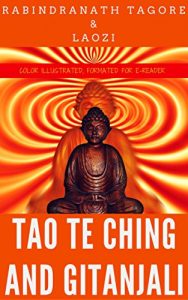How is this book unique?
Formatted for E-Readers, Unabridged & Original version. You will find it much more comfortable to read on your device/app. Easy on your eyes.
Includes: 15 Colored Illustrations and Biography
The Tao Te Ching, Daodejing, Dao De Jing, or Daode jing (simplified Chinese: 道德经; traditional Chinese: 道德經; pinyin: Dàodéjīng), also simply referred to as the Laozi (Chinese: 老子; pinyin: Lǎozǐ), is a Chinese classic text. According to tradition, it was written around 6th century BC by the sage Laozi (or Lao Tzu, Chinese: 老子; pinyin: Lǎozǐ, literally meaning "Old Master"), a record-keeper at the Zhou dynasty court, by whose name the text is known in China. The text's true authorship and date of composition or compilation are still debated, although the oldest excavated text dates back to the late 4th century BC.
The Tao Te Ching, along with the Zhuangzi, is a fundamental text for both philosophical and religious Taoism, and strongly influenced other schools, such as Legalism, Confucianism, and Chinese Buddhism, which when first introduced into China was largely interpreted through the use of Daoist words and concepts. Many Chinese artists, including poets, painters, calligraphers, and even gardeners, have used the Daodejing as a source of inspiration. Its influence has also spread widely outside East Asia, and is among the most translated works in world literature. The Wade–Giles romanization "Tao Te Ching" dates back to early English transliterations in the late 19th century; its influence can be seen in words and phrases that have become well established in English. "Daodejing" is the pinyin romanization.
Gitanjali (Bengali: গীতাঞ্জলি) is a collection of poems by the Indian poet Rabindranath Tagore. The original Bengali collection of 157 poems was published on August 14, 1910. The English Gitanjali or Song Offerings is a collection of 103 English poems of Tagore's own English translations of his Bengali poems first published in November 1912 by the India Society of London. It contained translations of 53 poems from the original Bengali Gitanjali, as well as 50 other poems which were from his drama Achalayatan and eight other books of poetry — mainly Gitimalya (17 poems), Naivedya (15 poems) and Kheya (11 poems).
The translations were often radical, leaving out or altering large chunks of the poem and in one instance fusing two separate poems (song 95, which unifies songs 89,90 of Naivedya). The translations were undertaken prior to a visit to England in 1912, where the poems were extremely well received. In 1913, Tagore became the first non-European to win the Nobel Prize for Literature, largely for the English Gitanjali. The English Gitanjali became very famous in the West, and was widely translated. The word gitanjali is composed from "gita", song, and "anjali", offering, and thus means – "An offering of songs"; but the word for offering, anjali, has a strong devotional connotation, so the title may also be interpreted as "prayer offering of song".












